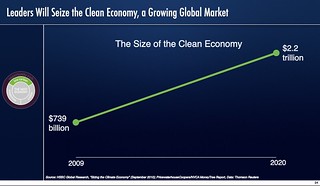Ironically,
Portland is the prime example in both
Amy Liu’s slides and
the book
 The Metropolitan Revolution:
How Cities and Metros Are Fixing Our Broken Politics and Fragile Economy
by Jennifer Bradley and Bruce Katz.
The Metropolitan Revolution:
How Cities and Metros Are Fixing Our Broken Politics and Fragile Economy
by Jennifer Bradley and Bruce Katz.
Here’s Bruce Katz in the Guardian 23 April 2012, Urbanization and Inventing a Clean Economy of Place,
Portland, Oregon, is also internationally renowned for its commitment to sustainable development. The Portland metropolis has an expansive public transit system and an urban growth boundary to control development at the urban periphery. The city boasts a green investment fund to provide grants for residential and commercial building projects.
Now the city is striving, like Copenhagen, to reap the economic rewards of sustainable development through business formation, firm expansion, job growth and private investment. In February, Portland released its first regional export plan to double exports over five years by building on the region’s distinctive economic and physical attributes. A critical pillar of this strategy involves increasing the export orientation of firms in the burgeoning clean technology sector to serve growing markets in Asia, Latin America and elsewhere.
Hm, a clean economy of place; there’s an idea. Here’s one of Portland’s green investments: 12W (Indigo) Project Report, Continue reading

